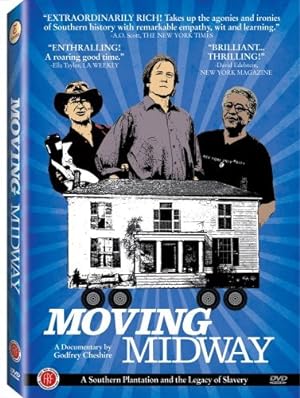Moving Midway is about a family, the family’s North Carolina plantation and the movie mythos of the plantation. One aspect of this story is more compelling than the others: the family, but Moving Midway did need to address all three in order for the story to be fully told. The main problem is that when the director, Godfrey Cheshire, who is also a NY film critic, focuses on the mythos, he uses an objective voice, a tone which he finds difficult to abandon when he focuses on his family and his family’s plantation, which he has fond childhood memories of as a second home when he lived in North Carolina. It is necessary to abandon the tone, but failing to do so makes for some excellent awkward moments between him, his family and his freshly reunited family, the descendants of their former slaves. Of course, everyone is enthusiastically and energetically cordial, but everyone is as careful as possible around each other. His family reassures themselves that their ancestors were kind because everyone got along or that the Civil War was about the states’ rights, not protecting money and property, which oops, happened to be in the form of human currency. The two branches of the family indeed share culture and experience based on blood, proximity and culture. What goes without saying is that kind people generally shouldn’t own people, especially siblings and lovers, if that is in fact what they were. Cheshire is in an awkward position-he knows that his family’s assertions can’t entirely be true and wants to make a honest documentary, but he is also protective of his family and their predilection for odd head gear. Robert Hinton, Associate Director of African-American studies at New York University and a blood relative, simply observes and amicably socializes, but when Cheshire asks him something directly, Hinton’s facial expression and answers cause Cheshire to be defensive regardless of the guardedness in the response. Cheshire says, “Don’t look at me like that.” Honestly if a look or line is bruising, I can’t imagine what a frank conversation would do to his psyche. Moving Midway is at its most compelling when it shows what is left unsaid and unintentionally asks if this reunion is a true reconciliation or only a first inadequate step. Relating that you economically suffered too by not being able to inherit property is not quite the same as a person being part of the inheritance, and that person being the founding reason that an inheritance even existed. One is unfair or inequitable. One is unjust and inhumane. Stop making false equivalencies. Stop rationalizing, openly acknowledge what your ancestors did, apologize and then everyone can move on. Moving Midway is a must see.





